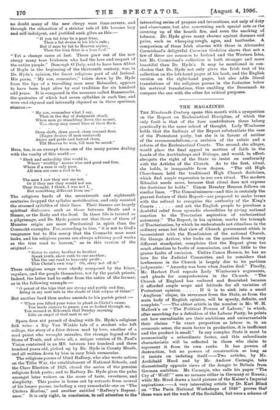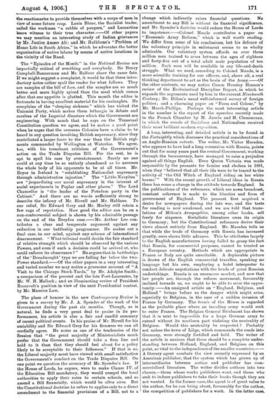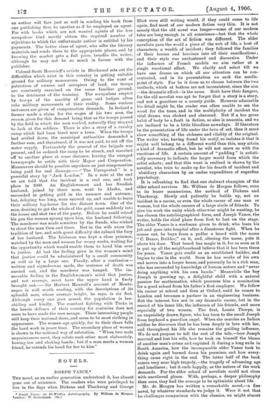THE MAGAZINES.
THE Nineteenth Century opens this month with a symposium on the Report on Ecclesiastical Discipline, of which the only fault is that of the four contributors three belong practically to the same school of thought. Lady Wimborne
holds that the findings of the Report substantiate the case of the Protestant party, but she is in favour of neither of the recommendations,—a revision of the rubric and a reform of the Ecclesiastical Courts. The second, she alleges, would place the final appeal in matters of faith in the hands of the Archbishops and Bishops, and would, in effect abrogate the right of the State to insist on conformity with the Articles of the Church. As to the first, ritual, she holds, is inseparable from dogma. "The old High Churchmen held the traditional High Church doctrines, which find ample expression in our own ritual. The modern Ritualist needs more, because that ritual does not express the doctrines he holds." Canon Hensley Henson follows on similar lines. "The Commissioners—and this is certainly the gravest feature of their Report—are prepared to make terms with the refusal to recognise the authority of the King's Courts and ask the English people to purchase a doubtful relief from sporadic absurdities by giving national sanction to the Tractarian aspiration of ecclesiastical autonomy." The Report, in his opinion, marks the triumph of Tractarianism, by which he understands not ritualism in the ordinary sense but that view of Church government which is inconsistent with the Erastianism of the national Church. Sir George Arthur, who looks on the question from a very different standpoint, complains that the Report gives too much attention to faults of commission, and too little to the graver faults of omission. Unlike Canon Henson, he has no love for the Judicial Committee, and he considers that lawlessness in the Church is largely due to its partisan judgments.- "Anarchy was born when Justice died." Finally, Mr. Herbert Paul repeats Lady Wimborne's arguments, and pleads for comprehension in the Church. "The Church of England has endured and flourished because it afforded ample scope and latitude for all varieties - of
Protestant opinion If it is to sink into a small Anglican' clique, its severance from the State, as from the main body of English opinion, will be speedy, definite, and complete."—The ablest article in the number is Mr. W. H. Mallock's on "The Political Powers of Labour," in which, after searching for a definition of the Labour Party, he _points out how unrealisable are their ambitions and unwarrantable their claims. "In exact proportion as labour is, in an economic sense, the main factor in production, it is inefficient and the product is small." In any complex State it must be economically a subordinate factor, and this subordinate characteristic will be reflected in those who claim to represent it from its own ranks. It has powers of destruction, but no powers of construction so long as it insists on isolating itself.—Two articles, by Mr. Archibald Hurd and by Mr. Andrew Carnegie, take diametrically opposite views of the danger to Britain from German ambition. Mr. Carnegie, who calls his paper "The Cry of 'Wolf!" sees no menace either in Germany or Russia ; while Mr. Hurd draws a lurid picture of the Kaiser's Imperial aspirations.—A very interesting article by Dr. Karl Blind on "The Paris National Workshops of 1848" proves that these were not the work of the Socialists, but were a scheme of the reactionaries to provide themselves with a corps of men in view-of some future coup. Louis Blanc, the Socialist leader, called the workmen "a rabble of paupers," and Lamartine bears witness to their true character.—Of other papers we may mention an interesting study of Indian grievances by Mr. Justice Ameer Ali; and Mr. Rathbone's "Problem of Home Life in South Africa," in which be advocates the better organisation of native labour by means of native locations in the Vicinity of the Rand.
The "Episodes of the Month" in the National Review are impartially critical of everthing and everybody. Sir Henry Campbell-Bannerman and Mr. Balfour share the same fate. If we might suggest a complaint, it would be that these intro- ductory notes rather spoil the reader for what follows. They are samples of the bill of fare, and the samples are so much better and more highly spiced than the meal which comes after that our appetite is glutted. This month the editor is fortunate in having excellent material for his onslaughts. He complains of the "sleeping sickness" which has visited the Unionist Party, which makes them lethargic in debate and careless of the Imperial disasters which the Government are engineering. With much that he says on the Transvaal Constitution question we agree, and he makes a good point when he urges that the overseas Colonies have a claim to be heard in any question involving British supremacy, since they contributed a larger force to the war than the British regi- ments commanded by Wellington at Waterloo. We agree, too, with his trenchant criticism of the Government's action on the Trade Disputes Bill. For the rest, he is apt to spoil his case by overstatement. Surely no one could at any time be so entirely abandoned as he assumes the whole body of his opponents to be at all times. Mr. Bryce in Ireland is "establishing Nationalist supremacy through administrative injustice." The " Little-Navyites " are "jeopardising our naval supremacy in the interest of social experiments in Poplar and other places." The Lord Chancellor is "the leader of the Potsdam party in the Cabinet." And there are no words sufficiently strong to describe the infamy of Mr. Birrell and Mr. Haldane. To our relief, Sir Edward Grey and Mr. Morley still retain a few rags of reputation. How good the editor can be on a non-controversial subject is shown by his admirable passage on the end of the Dreyfus ease.—Mi. Arthur Lee con- tributes a clear and temperate argument against any reduction in our battleship programme. He makes out a final case, to our mind, against any scheme of international disarmament. " What tribunal could decide the fair standard of relative strength which should be observed by the various Powers,-and even if such a decision could be arrived at, who could enforce its observance ?" He argues that in battleships of the Dreadnought' type we are falling far below the two- Power standard.—Of the other papers in a very interesting and varied number we may notice a gruesome account of "A Visit to the Chicago Stock-Yards," by Mr. Adolphe Smith; a comparison of the present and the late Poet-Laureates, by Mr. W. H. Mallook ; and an illuminating review of President Roosevelt's position in view of the next Presidential contest, by Mr. Maurice Low.
The place of honour in the new Contemporary Review is given to a survey by Mr. J. A. Spender of the work of the Government during the past six months. Though, as is natural, he finds a very great deal to praise in its per- formances, his article is also a fair and candid summary of recent political events. In his praise of Mr. Birrell for his amiability and Sir Edward Grey for his firmness we can all cordially agree. He notes as one of the tendencies of the Session that "the great majority of Ministerialists much prefer that the Government should take a firm line and hold to it than that they should feel about for a policy likely to be acceptable to their followers." If that is so, the Liberal majority must have viewed with small satisfaction the Government's conduct on the Trade Disputes Bill. On one point we question the accuracy of Mr. Spender's law. If the House of Lords, he argues, were to make Clause IV. of time Education Bill mandatory, they would compel the local authorities to apply their rates to certain schools, and so amend a Bill financially, which would be ultra sires. But the Constitutional doctrine he refers to applies only to a direct amendment to the financial provisions of a Bill, not to a change which indirectly raises financial questions. No amendment to any Bill is without its financial significant*, and Mr. Spender's doctrine would reduce the House of Lords to impotence.—Colonel Maude contributes a paper on "Economic Army Reform," which is well worth reading. We differ from some of his conclusions, but his defence of the voluntary principle in enlistment seems to us wholly admirable. Our voluntary system affords us over three million men trained to arms between the ages of eighteen and forty-five out of a total adult male population of ten million. Such men will be available in any life-and-death struggle. What we need, according to Colonel Maude, is a more scientific training for our officers, and, above all, a real thinking department to act as the brain of the Army.—Of the other contents, we may notice Canon Hensley Henson's review of the Ecclesiastical Discipline Report, in which he expands the arguments used by him in the current Nineteenth Century; Dr. Dillon's usual well-informed survey of foreign politics; and a charming paper on "Form and Colour," by Mr. March-Phillips. Perhaps the most interesting article in the number is the report of the speeches recently made in the French Chamber by M. Jaures and M. Clemenceau, in which the creeds of Socialism and Nationalism received their most brilliant modern exposition.
A long, interesting, and detailed article is to be found in the Fortnightly which discusses the practical considerations of an Anglo-Russian entente. The writer, Mr. Victor Marsden, who appears to have had a long connexion with Russia, points out that for many years past the central Government, working through the bureaucracy, have managed to raise a prejudice against all things English. Even Queen Victoria was made responsible by the peasants for famine and cholera in 1891, when they "believed that all their ills were to be traced to the activity of the Old Witch of England riding on her white horses.'" With the recent growth of Liberal ideas in Russia there has come a change in the attitude towards England. In the publications of the reformers, which are sown broadcast, constant reference is made to the liberties and form of government of England. The peasant first acquired a desire for newspapers during the late war, and the taste for reading is now awakened, and we are told that trans- lations of Milton's Areopagitica, among other books, sell freely for sixpence. Socialistic literature owes its origin. to Germany ; but the Constitutional reformers derive their. views almost entirely from England. Mr. Marsden tells us that while the trade of Germany with Russia has increased greatly, ours shows little advance. This be attributes largely to the English manufacturers having failed to grasp the fact that Russia, for commercial purposes, cannot be treated as a European country. Methods which are appropriate in France or Italy are quite unsuitable. A deplorable picture is drawn of the English commercial traveller, speaking no language but his own, employing a hotel interpreter to conduct delicate negotiations with the heads of great Russian undertakings. Russia is an enormous market, and now that her people are, through the reform movement, favourably inclined towards us, we ought to be able to seize the oppor- tunity.—An unsigned article on "England. Belgium, and Holland" brings before us the danger which might arise, especially to Belgium, in the case of a sudden invasion of France by Germany. The trouee of the Meuse is regarded as the probable place where an invading army would seek to enter France. The Belgian General Brialmont has shown that it is next to impossible for a large German army to extend without its northern part violating the neutrality of Belgium. Would this neutrality be respected Probably not unless the town of Liege, which commands the roads into Germany, were strongly fortified and held. The writer of the article is anxious that there should be a complete under- standing between Holland, England, and Belgium on this point, so vital to the independence of the smaller countries.— A literary agent combats the view recently expressed by an American publisher, that the system which has grown up of intermediaries between author and publisher has com-
mercialised literature. The writer divides authors into two classes,—those whose works publishers want, and those who
seek to induce publishers to take their books though they are not wanted. In the former ease, the agent is of great value to the author, for he can bring about, favourably for the author, the competition of publishers for a work. In the latter case,
an author will fare just as well in sending his book from one publishing firm to another as if he employed an agent. For with books which are not wanted agents of the less scrupulous kind merely obtain the required number of rejections to which the unfortunate author is entitled by his payments. The better class of agent, who sifts the literary materials and sends them to the appropriate places, and by knowing the market gets a full price, benefits the writer, although he may not be so much in favour with the publisher.
Colonel Scott Moncrieff's article in Blackwood sets out the difficulties which exist in this country in getting suitable ground for military manceuvres. Owing to the want of patriotism of owners and occupiers of land, our troops are constantly exercised on the same familiar ground, to the detriment of the training. The scrupulous respect by troops of the sanctity of game and hedges often robs military movements of their reality. Some curious instances are given of compensation demands. In Ireland a farmer made a claim for the wages of his two men, the reason given for this demand being that as the troops passed by the field in which the men worked, naturally they stopped to look at the soldiers. There is also a story of a. cavalry camp which had been hired near a town. When the troops Lad settled down, the municipal authorities demanded a further sum, and threatened, if it was not paid, to cut off the water supply. Fortunately the general of the brigade was present, and he ordered the camp to be struck, and marched off to another place at some distance, leaving the enraged townspeople to settle with their Mayor and Corporation. Manoeuvres should be possible anywhere on just compensation being paid for real damage.—" The Unexpected" is a powerful story by "Jack London." In a note at the end we are told that the incident is a real one, and took place in 1900. An Englishwoman and her Swedish husband, joined by three men, went to Alaska, and succeeded in getting gold in the summer and autumn ; but, delaying too long, were snowed up, and unable to leave their solitary log-house for the distant town. One of the men, desiring to get the whole of the gold, came suddenly into the house and shot two of the party. Before be could reload his gun the woman sprang upon him, the husband following. The murderer was made senseless by the Swede, who wished to shoot the man then and there. But in the wife arose the tradition of law, and with great difficulty she calmed the fury of her husband. The Irishman was kept a close prisoner, watched by the man and woman for weary weeks, waiting for the opportunity which would enable them to hand him over to justice. At last the feeling grew in the woman's mind that justice could be administered by a small community as well as by a large one. Finally, after a confession— written and signed—was made, the sentence of death was carried out, and the murderer was banged. The im- movable feeling in the Englishwoman's mind that justice, and not revenge, must have the upper band is finely brought out.—Sir Herbert Maxwell's account of Monte- negro is well worth reading, with the descriptions of its splendid men, whose average height. be says, is six feet. Although every one goes armed, the population is law- abiding and kindly. The constant fighting with Turks in the heroic defence of their country for centuries does not seem to have made the race savage. These interesting people still keep their national dress, and seem to be most striking in appearance. The women age quickly, for to their share falls the bard work in peace time. The secondary place of women is shown in the national way of salutation. "When two male acquaintances meet, they salute each other most elaborately, bowing low and shaking bands; but if a man meets a woman friend, he extends his hand for her to kiss."








































 Previous page
Previous page